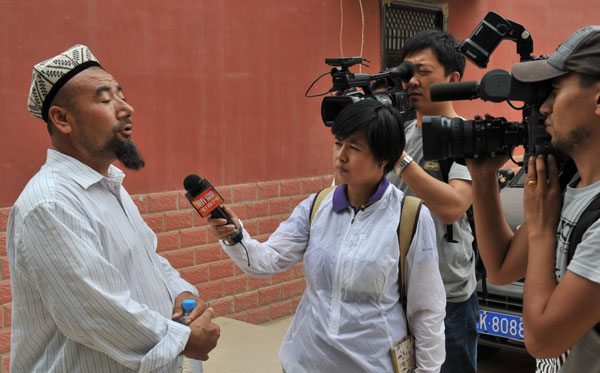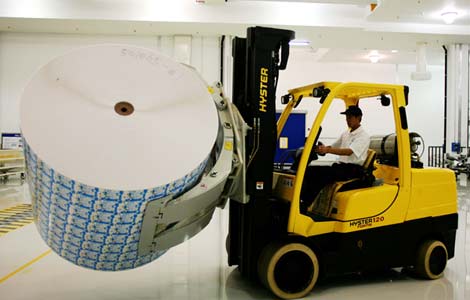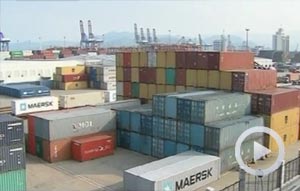Witnesses' account of Xinjiang terror attacks
Updated: 2013-07-06 07:55
(Xinhua/China Daily)
|
||||||||
More than one week after rioters killed 24 people at Lukqun Township in northwest China's Xinjiang Uygur Autonomous Region, the charred walls of a police station still serve as a painful reminder of that violent morning on June 26.
What happened on that bloody morning? Who were the rioters? What have caused a series of violent terrorist attacks in Xinjiang?
Over the past week, Xinhua reporters conducted extensive interviews with victims, witnesses, officials and experts to uncover more details of the terror attacks.
Bloody slaughter
Lukqun Township in Shanshan County is well known for its abundant melon and grape production. The police station, government building and the office building of the special patrol squadron are located from west to east along the township's main artery, with stores dotting both sides of the road.
At this time of year, local people usually start their day early in order to dodge the temperatures that begin to soar around noon. At dawn of June 26, about 1,000 workers gathered near a crossroad in the town center, waiting to pick and transport fruit.
|
 A religious figure in Lukqun Township gives an interview on the June 26 terrorist attack in Xinjiang. Zhen Shixin For China Daily |
No one could have known what was about to happen. Around 6 a.m., truck driver Liu Fei from Korla City in southern Xinjiang was awakened by noise outside. Through his windows, he saw flames spurting from the police station across the road and a chaotic scene on the street crowded with people.
Shortly after, he saw a group of people run out of the police station, wielding long knives. They jumped onto a motorized tricycle and piled into a black Volkswagen Santana sedan and rushed toward the township government building, followed by another group of shouting young people, some of whom were wearing masks.
What shocked Liu most was a human head in a pool of blood in the middle of the street.
The violent terrorist attack was the most severe since the July 5, 2009 riots that resulted in 197 deaths in Xinjiang's capital of Urumqi.
The police station was only the rioters' first target. They attacked the office building of the special patrol squadron, the township government building, a construction site, a private store and a beauty saloon. They also set fire to multiple cars and motorcycles.
Abulimit, a retired teacher who used to be up early, on that day was killed while trying to stop the rioters from attacking a pedestrian with their wielding long knives.
A security guard also saw the atrocities and alerted police. He was also killed while trying to stop the rioters.
The rioters also attacked a construction site, killing a number of workers there.
According to public security authorities, 24 people, including two females, were killed in the attack. Of the victims, 16 were ethnic Uygurs and eight were of Han ethnic. The attacks also left 21 others injured.
On the afternoon when Xinhua reporters arrived at Lukqun, the wreckage of charred or damaged cars, police vehicles and motorcycles could be seen along the road and in the yards outside the targeted buildings.
The shrouded bodies of some victims were lain in the backyard of the police station. A police officer told reporters that at least five victims were beheaded.
"The bodies of the police officers and civilians were all gathered here to be taken away, while the rioters' bodies were put in another place. We must not lay their bodies together," the police officer said, bursting into tears.
The terror attack shocked local communities, as the region of Turpan Prefecture that administers Shanshan County has witnessed fast development in recent years, and local people live a relatively well-off life.
"We are living a paradise-like life. But on that day, I saw the scenes of hell," said Suleyman, an ethnic Uygur who has lived in the township for more than three decades.
Masterminded terror attacks
Police investigations suggest that the multiple attacks in Shanshan on June 26 was a premeditated and organized violent terrorist crime.
Before the violent attack, rioters had internalized religious extremism spread by foreigners, carried out secretive and illegal religious activities, watched terrorist video footage, purchased criminal tools and familiarized themselves with the environment surrounding the targets, according to police investigations.
The way the attacks were carried out and the horror the perpetrators inflicted on the public was similar to the terrorist attacks in other countries, as the perpetrators were deluded by overseas terrorist organizations who incited them to action and scouted the targets multiple times ahead of the attack.
Police have learned that a group of people headed by Ahmatniyaz Sidiq and Eli Ahmatniyaz, both from Lukqun Township, began to illegally gather and watch terrorist video footage and listen to audio programs from the terrorist group East Turkistan Islamic Movement (ETIM) that spread so-called "jihad" principles.
After becoming religious extremists, they actively recruited members for a 17-member group to carry out illegal religious activities. Meanwhile, they mulled terrorist attacks and conspired to go abroad to participate in the "jihad," according to police.
Before the attack, two extremists from Kuqa County in southern Xinjiang mobilized the group to carry out a "jihad." As they considered it would be too difficult to go abroad, they instead planned to stage the violent attacks locally.
The evidence shows that, in plotting the attack, Eli Ahmatniyaz and some other members said clearly on June 20 that they wanted to "start a 'jihad' and do something big."
They set the town's police station and the special patrol squadron as their initial attack targets, then they would attack local government buildings and residents.
They raised funds and purchased 26 long knives, 21 daggers and 310 liters of gasoline. They also made 28 petrol bombs.
Police evidence shows that before the incident, some members of the gang conducted several scouting missions around the township government building, the police station and nearby places under the instigation of Eli Ahmatniyaz.
On June 26, the rioters staged the mobile attack, driving the motorized tricycle and the hijacked Santana car.
"I have seen that man before, as he often showed up on the street recently. I never thought that he was plotting such evil deeds," said a witness who had recognized the driver of the motorized tricycle. The witness preferred not to be name over fears of terrorists taking revenge.
The attacks unfolded in a way that many local people did not even think of.
Around 1:00 a.m. on that day, 16 rioters gathered for a religious ritual and they rushed to a gas station in three motorized tricycles and forced staff there to fill their cans with gas around 3:00 a.m.
Around 5:50 a.m., the rioters assaulted the police station in Lukqun and the township government building, axing officers, burning buildings and crashing cars.
While carrying out the attacks, the terrorists tried to kill everybody they saw along their way, attacking a beauty salon and a construction site, killing and injuring innocent people, including ethnic Uygurs.
The local government and police immediately launched counter-attacks. They killed 11 rioters and arrested four others. Many knives and gas cans used by the terrorists were confiscated.
"The attacks were well planned. The rioters wanted to get rid of law enforcement officers first and then attack the government and the civilians," said a wounded Uygur policeman, Askar, who gunned down several rioters.
Terrorists incited by 'three evil forces'
The knife-wielding rioters slaughtered innocent people regardless of sex, age or ethnicity.
Police evidence shows that these terrorists were incited into action and deluded by the "three evil forces" of terrorism, separatism and extremism.
Police said illegal religious activities and religious extremism have been increasing in Xinjiang in recent years due to the influence of hostile forces both at home and abroad. Some young people have had their thoughts changed and been deluded by religious extremists in videos about the "jihad."
Moreover, the "three evil forces" have frequently deluded and instigated hatred between different ethnics through online rumors. The collusion between the hostile forces at home and abroad made terrorists more organized.
Some extremist religious groups and extremist individuals organized illegal religious activities on the Internet, spread religious extremism, advocated the "jihad," recruited members and organized and plotted terrorist activities.
Many local residents said the public security situation in Lukqun Township had been deteriorating over the past year or two amid the growing religious extremism.
Abdurehim, a Lukqun resident, said some people have been advocating religious extremism by claiming that those who oppose their opinions are not real Muslims.
Li Changqing, chief officer of the town's police station who shot several rioters, said all the rioters were local people, mostly in their early-20s, who were affected by religious extremism.
Li said that some people had previously tried to stop all stores in the township from selling cigarettes and alcohol. They assaulted those who disobeyed them, set fires and created disorder in the township.
Investigations show that these acts were conducted by some religious extremists. Police had already arrested some suspects. The violent attack on June 26 occurred while those people were being investigated, said Li.
"We do not rule out that the direct cause of the terrorist attack was revenge by some extremists against the administrative and law enforcement departments. And the underlying cause is that they were brainwashed by extreme religious thoughts," Li said.
On June 25, one day ahead of the terrorist attack, police apprehended one member of the terrorists. Fearing their illegal activities would be exposed, Ahmatniyaz Sidiq, the terrorist ringleader, called on his accomplices to stage the attack.
Some of the rioters had previous convictions. Police investigations show that 40-year-old Ahmatniyaz Sidiq was sentenced to two-and-a-half years in prison at the end of 2001 for joining in a separatist group. Eli Ahmatniyaz, 31, a core member of the group, was also sentenced to four years in prison in 2004 for the same reason.
"I can hardly understand why they slaughtered indiscriminately. Don't they have their own parents and children?" said policeman Askar.
He said the incident disrupted normal life and harmony in the township, and people must stay vigilant against terrorists.
Crackdown on terrorists urged
A series of violent terrorist attacks in Xinjiang have taken many lives and created huge losses, damaging Xinjiang's social progress and ethnic unity.
Religious extremism has become the biggest threat to Xinjiang's security, said a Xinjiang researcher at Lanzhou Military Command Area, who requested anonymity in discussing the matter.
The "three evil forces" of terrorism, separatism and extremism were boosted, partly because some countries offered consent and support religious extremist forces, the researcher said.
"The violent terrorist attacks this year mainly targeted grassroots government agencies. The terrorists killed officials and residents of Uygur and other ethnics," said Pan Zhiping, a researcher at the Xinjiang Academy of Social Sciences.
"The attacks are typical cases of terrorism," Pan said. "They are targetting the Communist Party of China and the Chinese government, in an attempt to disrupte the good prospects of Xinjiang's development."
Whenever a violent terrorist attack occurs, the "three evil forces" and other hostile forces abroad will give speeches that confuse right and wrong, mislead the public and slander the Chinese government. Such speeches have encouraged the arrogance of terrorists, according to experts.
Yiblayan Eli, the last attacker at large in the Lukqun violent attack, was captured on June 30, thanks to tips given to police by the public. Two people selling knives to the terrorists were also arrested on the same day.
"Lukqun is a beautiful and peaceful town. The rioters damaged our good life and we hate them," said Zaytuna Ghalip, an employee at a photo studio in town. "But I believe our town will become better and safer."
"A dog's bark will never make a camel go astray," Turghan Pida, director of the Ethnic Affairs Commission of Xinjiang, said by citing a local proverb.
He said the terrorists could not represent any ethnic or any religion.
"They betrayed their motherland and their people. They are the common enemies of every Xinjiang people," Turghan Pida said.
Meanwhile, Xinjiang is facing a severe situation in maintaining stability.
A top Xinjiang public security official said police officers will always stay active in fighting terrorist crimes and severely crack down on terrorists. He also called on the public to actively expose terrorist schemes and contribute to maintaining social stability.
"Xinjiang is developing really fast. It has so many opportunities, especially in Turpan. Everything is developing very fast and we must cherish such good days," said a wounded policeman, who added that he will return to work after he is discharged from the hospital.
But the violent attack has cast a shadow over the small town in the midst of its harvest season.
"The grapes will start ripening by the end of July. We will convince traders to come to Lukqun and buy our products. The difficulty is only temporary," said Abdu Raxman Gupur, head of the township government.
- Anti-terror drill staged in Xinjiang
- Xinjiang offers rewards for tips
- CPC paper urges to safeguard stability in Xinjiang
- Xinjiang to reward terrorism whistleblowers
- Xinjiang violence reaction across Chinese media
- 19 detained for spreading rumors in Xinjiang
- Fugitive of Xinjiang attack captured
- Government pledges to clamp down on terrorism in Xinjiang
- Official urges 24-hour patrol in Xinjiang
- Xinjiang vows to maintain stability
- Foreign Ministry rejects US claims on Xinjiang

 China-Russia navy drill furthers ties
China-Russia navy drill furthers ties
 Passenger car sector outlook brightens
Passenger car sector outlook brightens
 Multinationals face increased scrutiny
Multinationals face increased scrutiny-
 Li: 'India is an important neighbor'
Li: 'India is an important neighbor' 
 Kobe Bryant reportedly has highest net worth in NBA
Kobe Bryant reportedly has highest net worth in NBA
 Chinese fleet arrives in Vladivostok for drills
Chinese fleet arrives in Vladivostok for drills
 Joey Chestnut wins 7th contest with 69 dogs
Joey Chestnut wins 7th contest with 69 dogs
 Lisicki, Bartoli to vie for new Wimbledon crown
Lisicki, Bartoli to vie for new Wimbledon crown
Most Viewed
Editor's Picks

|

|

|

|

|

|
Today's Top News
Multinationals face increased scrutiny
China, Pakistan ink transport pact
High hopes for China-US talks
Navy drill furthers ties
Guideline to stabilize capital flows
Li: 'India is an important neighbor'
South Sinai, Suez in emergency
Temple retreat a hot pursuit
US Weekly

|

|






